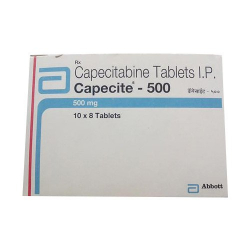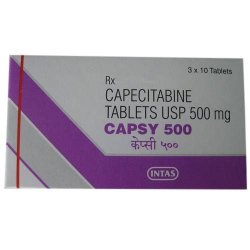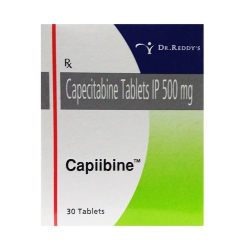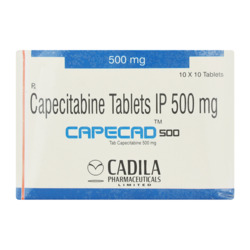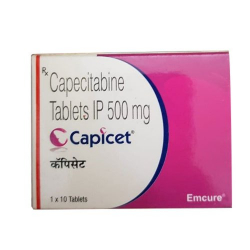
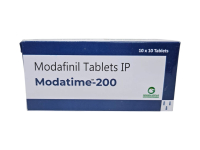
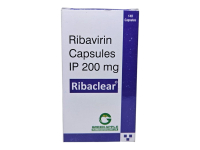
Capecitabine
Capecitabine Uses
Capecitabine is used to treat breast, colon, or rectal cancer. It works by slowing or stopping the growth of cancer cells.
How to use Capecitabine
Read the Patient Information Leaflet if available from your pharmacist before you start taking capecitabine and each time you get a refill. If you have any questions, ask your doctor or pharmacist.
Take this medication by mouth as directed by your doctor, usually 2 times a day; once in the morning and once in the evening. Swallow the tablets whole with a full glass of water (8 ounces/240 milliliters) within 30 minutes after a meal. Do not crush or split the tablets. If you have trouble swallowing the tablets whole, ask your health care professional for advice. Your doctor may direct you to take this medication in a treatment cycle. Carefully follow your doctor's instructions.
The dosage is based on your medical condition, body size, and response to treatment. Do not increase your dose or use this drug more often or for longer than prescribed. Your condition will not improve any faster, and your risk of side effects will increase.
Since this drug can be absorbed through the skin and lungs and may harm an unborn baby, women who are pregnant or who may become pregnant should not handle this medication or breathe the dust from the tablets.
Capecitabine Side Effects
Nausea, vomiting, loss of appetite, constipation, tiredness, weakness, headache, dizziness, trouble sleeping, or changes in taste may occur. Nausea and vomiting can be severe. In some cases, your doctor may prescribe medication to prevent or relieve nausea and vomiting. Eating several small meals, not eating before treatment, or limiting activity may help lessen some of these effects. If any of these effects last or get worse, tell your doctor or pharmacist promptly.
Diarrhea is a common side effect of this medication. Drink plenty of fluids unless directed otherwise. Your doctor may also prescribe medication (such as loperamide) to help lessen diarrhea. Vomiting or diarrhea that doesn't stop may result in a serious loss of body water (dehydration). Contact your doctor promptly if you notice any symptoms of dehydration, such as unusual decreased urination, unusual dry mouth/thirst, or dizziness/lightheadedness.
Temporary hair loss may occur. Normal hair growth should return after treatment has ended. Also, temporary nail changes may occur.
People using this medication may have serious side effects. However, your doctor has prescribed this drug because he or she has judged that the benefit to you is greater than the risk of side effects. Careful monitoring by your doctor may decrease your risk.
Stop taking capecitabine and tell your doctor right away if any of these very serious side effects occur: severe nausea/vomiting (vomiting 2 or more times per day, unable to eat or keep food/fluids in your stomach), painful redness/swelling/sores in mouth or on your tongue.
Capecitabine may make you develop a skin problem called hand-foot syndrome. To help prevent this, protect your hands and feet from heat or increased pressure. Avoid activities such as using hot dishwater, taking tub baths, jogging, long walks, or using garden or household tools such as screwdrivers. Symptoms may include pain, swelling, redness, blisters, or numbness of the hands/feet. Your doctor may prescribe medication (such as balm) to help with symptoms. If symptoms affect your usual activities, get medical help right away.
For men and women of childbearing age, this medication may affect your ability to have children. Ask your doctor for more details.
This medication may lower your ability to fight infections. This may make you more likely to get a serious (rarely fatal) infection or make any infection you have worse. Tell your doctor right away if you have any signs of infections (such as sore throat that doesn't go away, fever, chills, cough).
Tell your doctor right away if you have any serious side effects, including: easy bruising/bleeding, mental/mood changes (such as depression), swelling of the ankles/feet, vision changes, signs of kidney problems (such as change in the amount of urine), yellowing eyes/skin, dark urine.
Get medical help right away if you have any very serious side effects, such as: chest/jaw/left arm pain, unusual sweating, fainting, slow/fast/irregular heartbeat.
A very serious allergic reaction to this drug is rare. However, get medical help right away if you notice any symptoms of a serious allergic reaction, such as: rash/blisters/peeling, itching/swelling (especially of the face/tongue/throat), severe dizziness, trouble breathing.
This is not a complete list of possible side effects. If you notice other side effects not listed above, contact your doctor or pharmacist.
Capecitabine Precautions
Before taking capecitabine, tell your doctor or pharmacist if you are allergic to it; or to 5-fluorouracil; or if you have any other allergies. This product may contain inactive ingredients, which can cause allergic reactions or other problems. Talk to your pharmacist for more details.
Before using this medication, tell your doctor or pharmacist your medical history, especially of: lack of a certain enzyme (dihydropyrimidine dehydrogenase - DPD), blood disorders (such as bone marrow suppression), heart problems (such as heart failure), kidney disease, liver problems.
Capecitabine can make you more likely to get infections or may worsen any current infections. Avoid contact with people who have infections that may spread to others (such as chickenpox, measles, flu). Consult your doctor if you have been exposed to an infection or for more details.
Do not have immunizations/vaccinations without the consent of your doctor. Avoid contact with people who have recently received live vaccines (such as flu vaccine inhaled through the nose).
To lower the chance of getting cut, bruised, or injured, use caution with sharp objects like razors and nail cutters, and avoid activities such as contact sports.
This medication may make you more sensitive to the sun. Limit your time in the sun. Avoid tanning booths and sunlamps. Use sunscreen and wear protective clothing when outdoors. Get medical help right away if you get sunburned or have skin blisters/redness.
This drug may make you dizzy. Alcohol or marijuana (cannabis) can make you more dizzy. Do not drive, use machinery, or do anything that needs alertness until you can do it safely. Limit alcoholic beverages. Talk to your doctor if you are using marijuana (cannabis).
Before having surgery, tell your doctor or dentist about all the products you use (including prescription drugs, nonprescription drugs, and herbal products).
Older adults may be more sensitive to the side effects of this medication, especially nausea, vomiting, diarrhea, and hand-foot syndrome.
Tell your doctor if you are pregnant or plan to become pregnant. You should not become pregnant while you are using capecitabine. Capecitabine may harm an unborn baby. Ask about reliable forms of birth control. Women of childbearing age should use reliable forms of birth control during treatment and for 6 months after the last dose. Men with female partners of childbearing age should use reliable forms of birth control during treatment and for 3 months after the last dose. If you or your partner become pregnant, talk to your doctor right away about capecitabine's risks and benefits.
Since this drug can be absorbed through the skin and lungs and may harm an unborn baby, women who are pregnant or who may become pregnant should not handle this medication or breathe the dust from the tablets.
It is unknown if this drug passes into breast milk. Because of the possible risk to the infant, breast-feeding while using this drug is not recommended during treatment and for 2 weeks after the last dose. Consult your doctor before breast-feeding.
Capecitabine Interactions
See also Warning section.
Drug interactions may change how your medications work or increase your risk for serious side effects. This document does not contain all possible drug interactions. Keep a list of all the products you use (such as prescription/nonprescription drugs and herbal products) and share it with your doctor and pharmacist. Do not start, stop, or change the dosage of any medicines without your doctor's approval.
A product that may interact with this drug is: allopurinol.
Capecitabine is very similar to fluorouracil. Do not use medications containing fluorouracil while using capecitabine.
Note: We strongly encourage you to talk with your health care professional about your specific medical condition and treatments. The information contained in this website is meant to be helpful and educational, but is not a substitute for medical advice.
Capecitabine View Uses, Side Effects and Medicines, cost, Capecitabine price.















